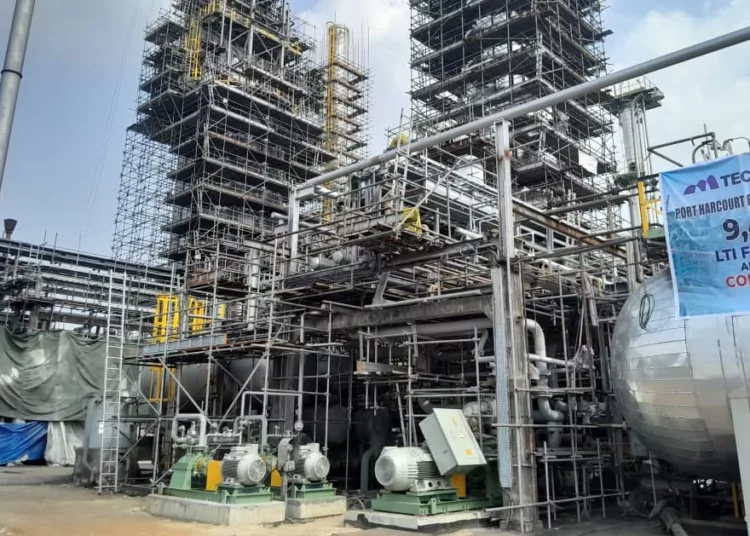The federal government has successfully unlocked a total refining capacity of 117,000 barrels per day (bpd) with the operational take-off of both the Warri and Port Harcourt refineries in November and December 2024, respectively.
The old Port Harcourt refinery, which resumed production on November 26, 2024, after extensive rehabilitation, currently operates at 70 per cent, thus accounting for 42,000 barrels per day capacity while the Warri refinery restarted operations on Monday, December 30, 2024, at 60 per cent capacity, translating to 75,000 barrels per day.
Group CEO of the Nigerian National Petroleum Company Limited (NNPC), Mele Kyari, on Monday disclosed that the Warri Refining & Petrochemicals Company (WRPC), in Warri, Delta State, with a capacity of 125,000 barrels per day, had resumed operations at 60 per cent capacity.
This revival is expected to enhance Nigeria’s energy security and reduce reliance on imported refined products, marking a significant step in the country’s refining sector transformation.
Group chief executive officer of the state-owned oil company, Mele Kyari, who made this known during a visit to the facility on Monday, said many Nigerians doubted the project’s feasibility, but the plant’s current shape proves its success.
The CEO of the Nigerian Midstream and Downstream Petroleum Regulatory Authority (NMDPRA), Farouk Ahmed, was in the team that toured the facility.
Addressing his team before commencing the tour, Kyari said, “We are taking you through our plant. This plant is running. Although it is not 100 per cent complete, we are still in the process. Many people think these things are not real. They think real things are not possible in this country. We want you to see that this is real.”
Situated in Ekpan, Uwvie, and Ubeji areas of Warri, the petrochemical plant has an annual production capacity of 13,000 metric tonnes of polypropylene and 18,000 metric tonnes of carbon black. Commissioned in 1978, the WRPC is operated by the NNPC and was established to cater to the markets in Nigeria’s southern and southwestern regions.
Kyari said: “I must congratulate our team for their determination and extreme belief that this company can restart this plant.
“This has brought the result we are seeing in collaboration with our contractors. We have proved that it is possible to restart a plant that you deliberately shut down. We have proved this.
“This plant has three stages. We have started stage one which is called Area 1, able to produce AGO (diesel), Kerosene, naphtha and others. These are brands of high-quality products required in the country. We will also be able to export them. This country will make money to meet the promises of Mr President that this country will be an exporter of petroleum products,” he said.
Hopes of an improvement in the nation’s refining capacity were re-kindled yesterday as the ailing Warri Refining and Petrochemicals Company (WRPC) resumed operations after many years of inactivity in the plant.
LEADERSHIP gathered that the refining plant was revamped by a Korean construction giant, Daewoo Engineering and Construction Company Limited, for a whopping $1.5 bn.
LEADERSHIP further learnt that the plant resumed operations on Monday at 60 per cent of its installed capacity of 125,000 barrels of crude oil daily.
The Group Chief Executive Officer of the Nigeria National Petroleum Company Limited (NNPCL), Engineer Mele Kyari, disclosed WRPC’s latest fate when he led the organisation’s top brass on a visit to the plant on Monday.
The latest fate of WRPC came after months of failed promises by NNPCL’s management to bring the plant back onstream.
Despite assurances from the board of NNPCL, President Bola Ahmed Tinubu promised Nigerians that WRPC would come on stream in the first quarter of 2024.
Kyari, while breaking the news during Monday’s plant tour, expressed joy over the development.
He praised the project’s management team for eventually restoring the plant to steady production of all petroleum products.
Kyari said, “We are taking you through our plant. This plant is running. Although it is not 100 per cent complete, we are still in the process.
“Many people think these things are not real. They think real things are not possible in this country. We want you to see that this is real.”
The Warri refinery was slated to produce 13,000 million tons per annum (MTA) of polypropylene and 18,000 MTA of carbon black.
The petrochemical plant was commissioned in 1978 to service the country’s South-South and South-West geopolitical zones.
LEADERSHIP recalls that successive management of NNPCL failed to initiate the planned shutdown of the plant or its central units for overhauling, a process known in the oil industry as Turnaround Maintenance (TAM). This resulted in epileptic operations and eventually forced the closure of the plant.
The goal of TAM, expected to occur every four to five years, is to improve equipment reliability and production integrity and reduce the risk of unscheduled outages.
Monday’s development in WRPC came weeks after a similar incident at the Port-Harcourt refinery, also managed by NNPCL.
Oil industry stakeholders expressed conviction that the two plants’ resumption of operations would enhance the nation’s local refining capacity and significantly reduce dependence on imported petroleum products.






